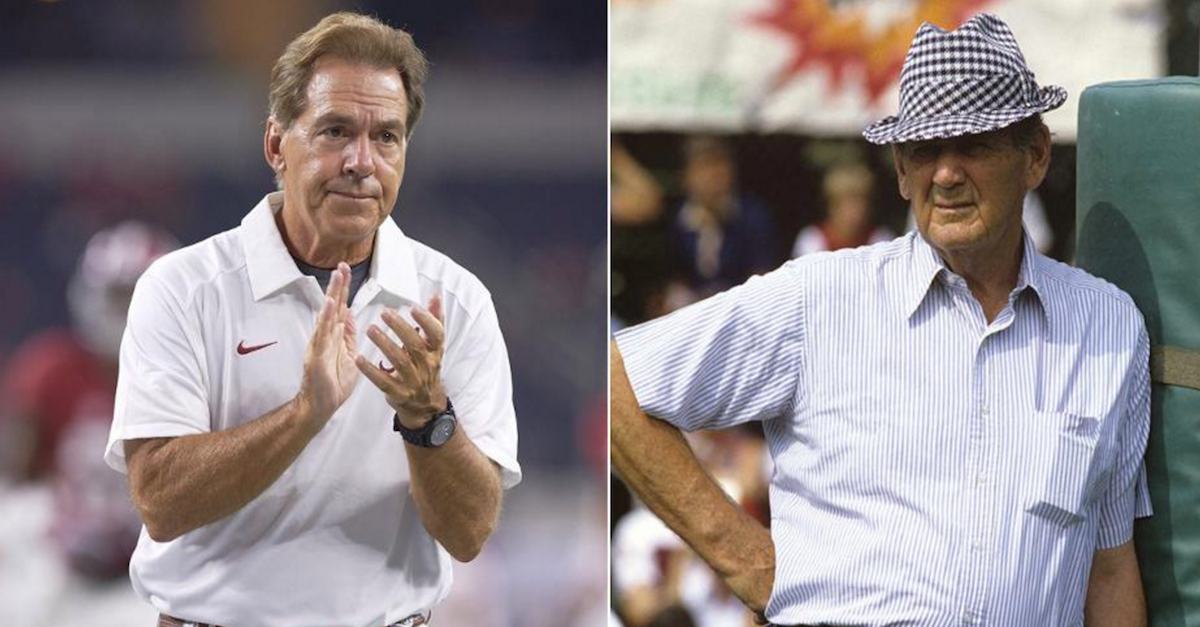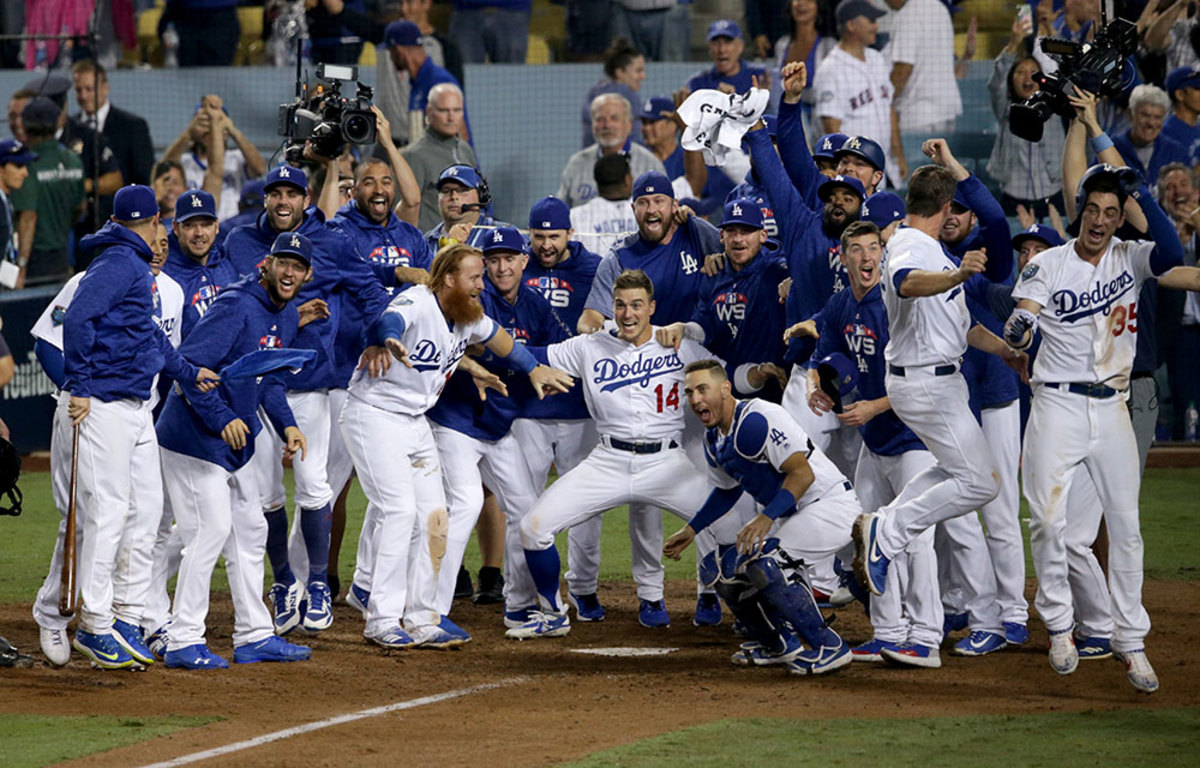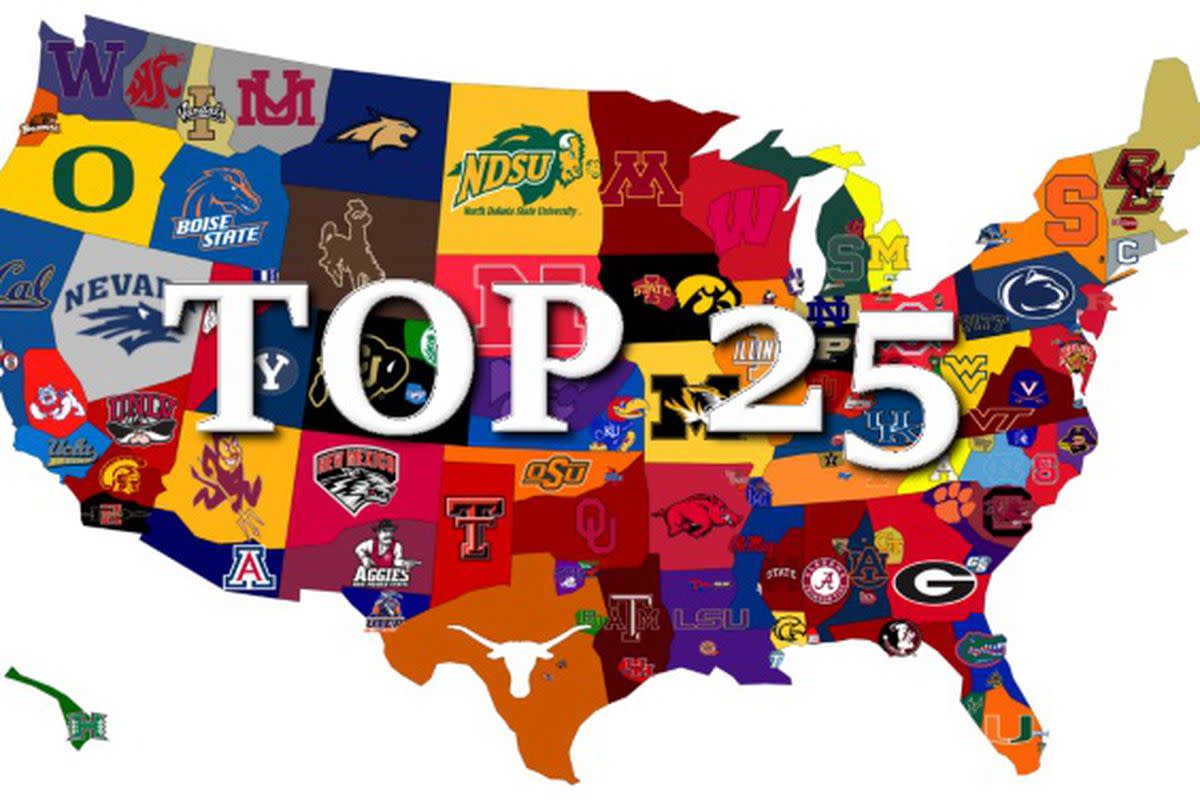- HubPages»
- Sports and Recreation»
- Team Sports»
- American Football
The College Football Bowl Season and the Bully that is ESPN
Synopsis:
The following article analyzes the stranglehold that ESPN currently has on the college football bowl season, and how this monopoly is used to extort disproportionate amounts of money from the general public.
Whether you are a fan of sports or not, this article should serve as a process analysis of how big business really works, by gaining lone control of a market, then raising prices to a point that is uncomfortable for consumers with no regard of anything but profit for ownership.

ESPN, the Best of the Best:
ESPN got to where they are today, as the preeminent sports provider, by being the best at what they do, and not just for a little while, but for decades on end. In fact, ESPN invented 24 hour sports coverage, and though there have been some imitators over the years, nobody has ever matched their quality.
That’s not to say that sports coverage on other channels is always poor, or that they deserve to be done away with, but as far as ease of getting around the clock information, whether it be through the innovative scrolling tickers ESPN developed for television, their state of the art website, or any of the many ways ESPN can be accessed, everything else always has a way of looking second rate in comparison.
Yet there have been some disturbing, even unethical conflicts of interest in ESPN’s behavior over the years, especially recent years. That said, they still provide the most engaging, compelling, and meaningful sports coverage out there today.
ESPN and the College Football Regular Season:
If it’s the regular season and you want to watch some college football, the number available is staggering. Even if your interest is in seeing Lehigh play The Citadel, it’s probably out there somewhere. You might have to purchase it on pay-for-view, but how else are the providers supposed to make money on a game like Lehigh versus The Citadel?
And even if you are among the few in this country that prefer to let big business foot the bill, and you put up an antenna, the games selection is pretty good. In fact, these network games are often the best games to be had. Why? Because the wealthy entities buying ad space on these games want to see a return on their investments. No matter how they try to skew things, they aren’t “giving” you anything for free.
It’s a system that has worked since the advent of network television. Business owners peddle their wares, networks peddle their shows, and everybody is provided a service. Viewers are provided entertainment, the network is provided money for advertisement placement, and advertisers are eventually provided money through exposure to viewers.
So of course Michigan versus Ohio State is on network television; of course you have USC versus Stanford; of course you have Oklahoma versus Texas! Or is it that simple?
Good ESPN versus Evil ESPN:
The chain of command goes something like this: Disney owns ABC and 80% of ESPN (Wikipedia). ESPN broadcasts most of its premier games during the regular season on ABC.
What games play in a given area during this timeframe is somewhat regional. For example, if Florida is playing Florida State on the same week that Michigan State plays Michigan, the regions with the largest fan base for the game often determines which team is shown on network television there. So in Indiana, most likely, the Michigan, Michigan State game would be televised on ABC, while Florida, Florida State would be on ESPN, and in Alabama we would have the opposite.
And that’s swell! Give the folks what they want; it’s a novel concept apt to make the hardest man smile. But for some crazy reason this paradigm totally shuts down come bowl season. Why? Do the good folks at ESPN just forget how to properly run a television station? Does ABC have such a wonderful television lineup during the holidays that not a single moment can be spared to something as trivial as football?
Maybe, but might it have something to do with the fact that ESPN owns broadcast rights to 93% of all college bowl games(ESPN.com)? Would it be entirely asinine to suggest that during the regular season all major antenna channels offer premier football, so ESPN knows they have to provide an accessible product to compete, but during the bowl season they know they can get away with being greedy pigs, and when a large company can get away with being greedy pigs, well, isn’t that exactly what they do?
And how greedy are these piggies? It will change the way you look at cable television forever once you find out. Below is a list of the most expensive cable channels per month as estimated by The Wall Street Journal in 2014. You’ll note the cost of subscribing to ESPN is over 4 times the cost of the next most expensive network.
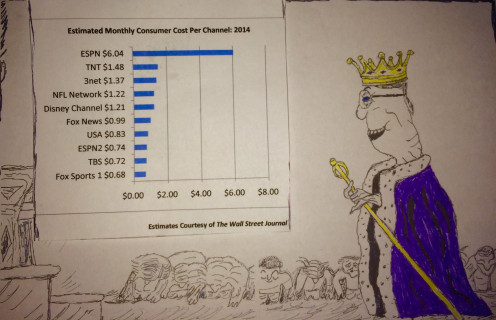
And what you don’t see in the above illustration is that the median cost per cable channel averages out to something in the neighborhood of $0.14 per month (Wall Street Journal). Do you still want to subscribe to ESPN, a channel that in some cases costs more than premium commercial free movie channels? Read on.
What Bowl Games can those of us on Antenna See?
There are 41 bowl games this year; 38 of those will be on ESPN or one of its affiliates. 3 of them will be on ABC for all to see, 2 will be on ESPN2, and 33 will be on ESPN. Of the 3 bowls not associated with ESPN, 1 will be on CBS, 1 will likely air on an antenna network like CW through a provider called Campus Insiders, and 1 will show on the cable network CBSSN (ESPN.com).
Well, you’re probably saying to yourself, that’s easy deduction. There are three playoff games. The three ABC games must be the college playoff series! It is a logical assumption that the most anticipated college football games all season will be the ones ESPN shows, because they are commercially viable.
Industry will pay big money to have their ads on during these games, and until recent years, that is how things have always worked. But no, these games are on ESPN, because ESPN has no real competition during the bowl season and the second a big company can bully its viewers with impunity, that is exactly what they do.
In fact, the bowl games that are appearing on network television make for a selection that is downright peculiar. If you look at the short list of major network bowl games below, you see one quasi big market contest when you factor in team records and size of fan base: Michigan versus Florida. The rest of the games range from solid contests to really poor bowls that may just as well not exist (ESPN.com).
Bowl Quality Rankings Bowls Available on Antenna TV
Bowl
| Team, Record, and Conference
| Team, Record, and Conference
| Quality of Bowl
|
|---|---|---|---|
1. Buffalo Wild Wings Citrus Bowl
| Michigan (9-3)
| Florida (10-3)
| 4/5
|
Big 10
| SEC
| ||
2. Royal Purple Las Vegas Bowl
| BYU (9-3)
| Utah (9-3)
| 3/5
|
Ind
| Pac 12
| ||
3. Hyundai Sun Bowl
| Miami (8-4)
| Wash St. (8-4)
| 2.5/5
|
ACC
| Pac 12
| ||
4. New Era Pinstripe Bowl
| Indiana (6-6)
| Duke (7-5)
| 1.5/5
|
Big 10
| ACC
| ||
5. NOVA Home Loans Arizona Bowl
| Nevada (6-6)
| Col St. (7-5)
| 0/5
|
MWC
| MWC
|
*Quality of bowl is accessed as a function of potential viewership for marketing purposes.
These are the sorts of bowl games that used to appear on cable to no real surprise of viewers, because they are enough of a niche market commercially to justify fans shelling out some cash on their own(Not $6.00 a month!) to see.
They are the sort of games that if you have cable and like football, you might watch, or if you have ties to one of the schools or you have just had a vasectomy and are on bed rest. But they aren’t the kind of games many people plan their lives around. They aren’t the sort of games that are worthy of network television.
Why are the Bowl Games being Televised on Network TV so Blah?
It used to be a given that the big name bowl games were on network TV. So what gives? What’s ESPN’s end game here? The following is a bit of hypothesis and conjecture as to the ways of mad men.
Some of the reasoning is already established. ESPN has a monopoly on college football bowl rights. They could make a boatload of money traditionally by showing their best bowls on network television and charging premium prices for commercial ad space. But instead, since they can, they have decided to show the important bowl games on their overpriced cable network, and in addition to this, charge premium prices for commercial ad space.
The above conjectures are hard to refute, but why put lousy games on your major network that will likely lose money? That’s the real head scratcher, but here goes nothing. Maybe they want to be able to point to these bowl numbers to erroneously establish that bowl games on antenna networks somehow magically don’t turn a profit anymore.
Then when ESPN catches heat for not showing more bowl games on network television, the bean counters can say, “But see, there’s no money in it.”
And as we get farther into the ether, let’s say ESPN makes more money than it ever has this year. Who will those extra profits likely go to? Some token amount will probably go to the people at ESPN who actually work hard and make an honest wage, but most likely a disproportionate amount will go to the people at the very tippety top.
If it is like most big business, they will pay themselves so much, that yes, it will appear that ESPN will go completely under unless cable subscribers continue to pay ever increasingly ridiculous fees, when in reality the only reason ESPN is in crisis is because a handful of people are disgustingly overcompensated and entirely unwilling to compromise in any way.
Then maybe ESPN gains complete control of college football, something they are dangerously close to doing already (As well as with a number of other sports). Then, all of a sudden, no college football games are on network television. Then they gain complete control of another sport and another sport, and before you know it, nobody can enjoy any sports for free anymore.
And then we move on to the very real agenda of all the major networks following suit and free TV being done away with all together because of the perpetuation of this lie that free TV for consumers can’t go on as it always has, that it doesn’t make money anymore because the world has changed in some abstract and overwhelmingly vague way that us poor peasants couldn’t possibly understand because we’re just too stupid to comprehend the ways of industry.
Then things get really scary because little old ladies that can’t pay for cable anymore on their meager pensions have no free TV, which means no weather advisory, no threat alerts, no Sesame Street for their little grandchildren to watch.
And things like “news” lose all credibility because no thoughts are deemed valid unless they are bought and paid for by someone wealthy enough to have sway.
But it doesn’t stop with television becoming subscription based. At some point down the road a very fat, very rich pig decides they’ve hit a ceiling and won’t be able to validate their existence by stealing a little more from society than their parents before them unless a new farce is created. Then a scheme is hatched to make all TV, every last show, a pay-per-view enterprise.
And wow how things have wondered from the simple concept of too few bowl games on network television. A crackpot delusion? Maybe? You decide.
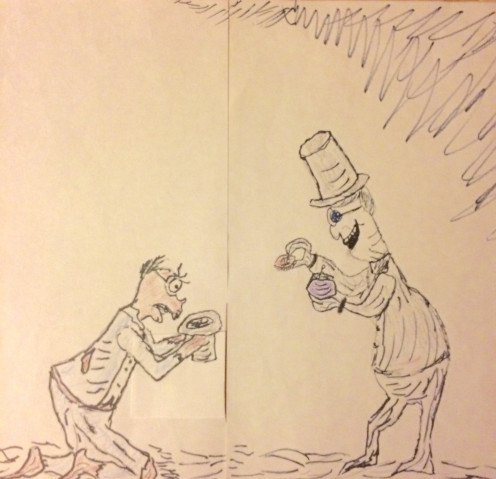
Opinion:
Do you believe ESPN takes unfair advantage of consumers?
How to Get More Relevant Bowl Games Back on Network Television:
Whether or not you agree with the dooms day scenarios speculated above, can it at least be agreed upon that it is stupid to pay for what was once provided for free? Can it at least be agreed upon that it is disrespectful for ESPN to take away something that was accessible and provided a significant profit to make it more elitist and even more profitable, to try to strong arm lovers of the game of college football into subscribing to a network they can’t really afford, that is needlessly expensive?
Here’s an insane statistic. According to Wikipedia, 81% of households in the U.S. are paying for the privilege of having access to ESPN. It is almost certain the lion’s share of these people have no idea what percentage of their bill ESPN is costing them. Most cable packages include ESPN, and in many cases things are structured in such a way that you can’t find an enticing viewing package that doesn’t include it.
It’s all bullying and there’s only one way to beat it. Bully back! Be willing to suffer a bit and say, NO! Demand quality TV packages that don’t include ESPN. If your cable provider doesn’t offer such a package, cut ties with them until they do. Demand ESPN lower their prices. Don’t watch premier games on ESPN that should be offered on Network Television.
But you say your internet offers live, streaming ESPN games for free? Why do you think your internet bill is so expensive? It’s paid for, whether you use it or not, whether you agree to it or not, in many cases, whether you even know it is part of your internet package. Get rid of internet providers that offer ESPN for “free”! (This is in reference to ESPN games shown live and streaming, not the ESPN.com site, which does provide many services free of charge.)
Listen to games on the radio, not through ESPN on XM, though, through a local station on the radio or through an internet app. And finally, if you must see a bowl game and can’t afford the price of a ticket, and true fans sometimes truly must, then go to your local sports bar. At least then ESPN’s profits are being mitigated a great deal.
Bring ESPN down enough so they understand that we matter, that we pay their bills, and we don’t have to pay them, regardless of how good a product they produce. It will work, if only the American people decide to enforce their will. We are not powerless in this.


